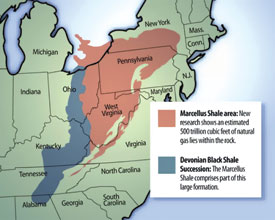Pitt Researchers Undertake $1.06 Million Federal Project To Curtail, Reuse Wastewater From Marcellus Shale Drilling

The U.S. Department of Energy recently selected the University of Pittsburgh as one of nine national partners that will develop techniques for curtailing the possible environmental and health hazards associated with tapping the massive natural gas reserves lying beneath Pennsylvania and surrounding states. Roughly 70 percent of Pennsylvania sits atop the Marcellus Shale formation, which experts estimate contains up to 500 trillion cubic feet of natural gas with about $500 billion worth of recoverable gas.
Researchers in Pitt’s Swanson School of Engineering will lead a three-year, $1.06 million project to better manage the wastewater generated by the extraction process used on the Marcellus Shale. Difficult to treat, the wastewater usually languishes in reservoirs or the environment. The Pitt approach calls for a new method that would allow the water to be safely reused in gas wells that would contain extraction costs, limit the byproducts flowing into the environment, and reduce the strain on freshwater sources currently tapped during extraction. Furthermore, the researchers seek to tackle the problem of acid mine drainage—the environmentally damaging water flowing from old mines—by using it as a sanitizer and supplemental water source.
“Our approach is to not only reuse the wastewater, but also reduce the level of treatment it requires prior to being reused, which should be a much more economical approach,” said Radisav Vidic, chair of the Swanson School’s Department of Civil and Environmental Engineering and a William Kepler Whiteford professor. “And by reusing the acid mine drainage readily available at many gas drilling locations, we can manage acid mine drainage from older mines and wastewater from current drilling operations, both of which are serious environmental concerns.”
Vidic heads the project with Eric Beckman, codirector of Pitt’s Mascaro Center for Sustainable Innovation and the George M. Bevier Professor of Chemical and Petroleum Engineering. They will work with Carnegie Mellon University assistant professor Kelvin Gregory. The National Energy Technology Laboratory (NETL)—the lead research and development office for the U.S. energy department’s Office of Fossil Energy—will contribute more than $794,000 to the effort, and Pitt will provide around $269,000.
The technique for mining the Marcellus Shale is known as hydraulic fracturing. A high-pressure mix of local-source freshwater, sand, and various chemicals known as “slicking agents” fractures the rock formation and allows trapped gas to escape. One gas well can consume 2 to 5 million gallons of fluid with 25 to 100 percent of it returning to the surface as wastewater, or “flowback.” Flowback contains varying levels of hydrocarbons, heavy metals, natural radioactive materials, and very high levels of total dissolved solids (TDS). TDS includes such substances as calcium, potassium, sodium, chloride, and carbonate; Marcellus Shale flowback tends to have much higher concentrations of TDS than wastewater from other hydraulic fractured sites.
In Pennsylvania, flowback—which can have five times the salinity of seawater—is typically stored in reservoirs or trucked to a brine treatment plant. But current treatment processes cannot remove the majority of TDS, so many of these substances typically end up in surface water. In their project proposal, the Pitt team refers to a 2008 incident, when treated flowback released into the Monongahela River resulted in TDS levels exceeding safety limits set by the Pennsylvania Department of Environmental Protection. The department restricted the amount of flowback treatment plants could receive, which halted some drilling operations in Western Pennsylvania.
To contain flowback pollution and freshwater consumption, Vidic and Beckman will first develop new slicking agents that would be stable in high-salinity water. These chemicals would allow for the flowback to be reused in adjacent gas wells without extensive off-site purification. Then, they will study the use of locally available acid mine drainage to further treat the flowback and simultaneously supplement the freshwater supply. Finally, the cleaner flowback would be pumped back into the gas well, reducing the strain on freshwater sources and curtailing costs of shipping and storing wastewater. The project will consist of a research phase and a subsequent field-demonstration phase.
Pitt is the only Pennsylvania institution granted a project. The eight other projects include ALL Consulting in Tulsa, Okla.; General Electrical Company; West Virginia University; the University of Arkansas; the Ground Water Protection Research Foundation in Oklahoma City; the Geological Survey of Alabama; Altela Inc. in Albuquerque; and the Texas Engineering Experiment Station.
More information on the projects is available on the U.S. energy department Web site at www.fossil.energy.gov/news/techlines/2009/09058-DOE_Selects_Natural_Gas_Projects.html.
Other Stories From This Issue
On the Freedom Road

Follow a group of Pitt students on the Returning to the Roots of Civil Rights bus tour, a nine-day, 2,300-mile journey crisscrossing five states.
Day 1: The Awakening
Day 2: Deep Impressions
Day 3: Music, Montgomery, and More
Day 4: Looking Back, Looking Forward
Day 5: Learning to Remember
Day 6: The Mountaintop
Day 7: Slavery and Beyond
Day 8: Lessons to Bring Home
Day 9: Final Lessons

